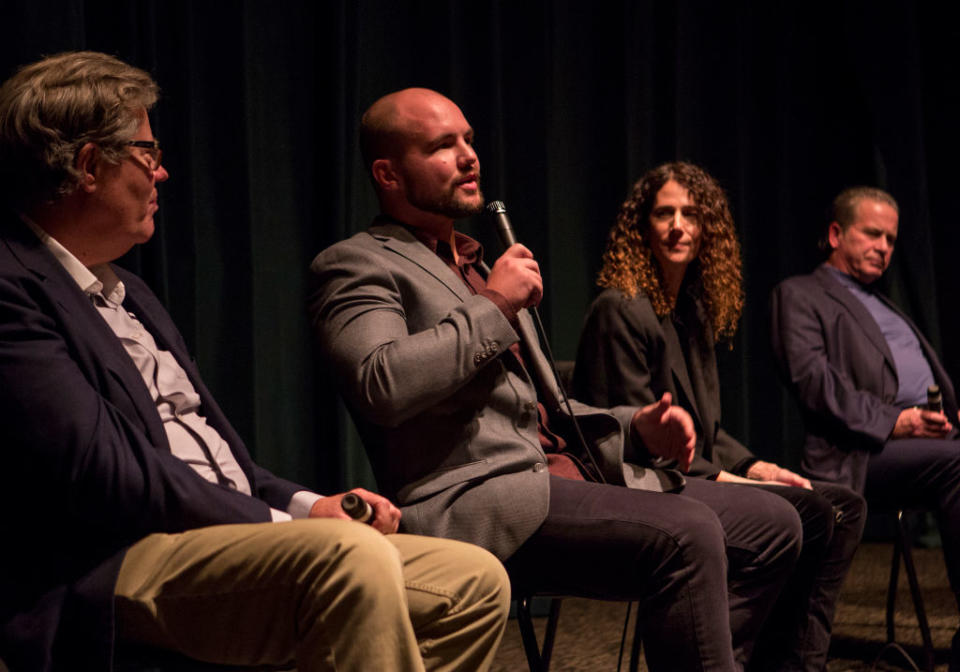Chris Borland finding life after football isn't easy

For Chris Borland, the low point came after he left the game.
It was the former San Francisco 49ers linebacker, you’ll remember, who retired abruptly after a stellar 2014 rookie season. He was concerned about his long-term brain health, specifically chronic traumatic encephalopathy (CTE).
“Naively I didn’t think I’d be a huge story at all,” Borland said by phone Monday morning. “I’ll do these media interviews, do some fundraising and be done with it. Then I was going to come home [from travel] and sort out my life.”
Instead, he turned into a third rail – a walking, talking point of contention about the future of the sport. ESPN called him “the most dangerous man in football.”
“I thought, ‘Wow, this isn’t going anywhere,’ ” he said. “I fell into a funk. I was trapped in a role I didn’t want. It was a hard couple of months.”
He said he considered leaving the country.
Borland has no regrets about his decision to retire, but at the same time he got a lesson about the calm after the storm: sometimes walking away leads to its own challenges. He’s sharing that with active players who ask him about retirement, and he says he gets texts fairly often (once every other week or so) from players in the NFL who are having some of the same doubts about the game he had in 2014.
He’s also bringing the message to military veterans as part of his work with After The Impact fund, which facilitates custom treatment plans for military veterans and former NFL players with traumatic injuries.
“Even if you’re entirely healthy and have to go through that dramatic shift [into retirement], it’s really, really hard,” Borland said. “That’s something I wouldn’t want to be used as shirking how bad the [physical] damage could be. But it’s part of the reason you have 20 suicides a day [among military vets].”
Borland feels there’s often a match between the personalities of former football players and those of vets.
“Type A personalities,” he said. “They have objectives; they enjoy working hard and not putting up with nonsense. These groups have a very intense life, and when they transition into civilian life, they’re cast into a more methodical lifestyle.”
Borland calls that transition “disequilibrium.” He faced it too.
“It’s been difficult,” he said. “If you gave me an hour in the day between ’09 and ’14, I could have told you exactly where I was and what I was doing. It’s still something to get used to. There’s no amount of advice or book you can read. I wouldn’t say it went entirely smoothly.”
And when you’ve had a career of concussions and subconcussive hits, followed by a sudden change of structure, it can add up to a host of mental hurdles. Borland says he had 13 concussions in his football career (two were diagnosed). But it’s the other hits that take a more unknown and potentially serious toll. “It’s about all the little hits,” he said. “You may feel different but there still could be issues going on with your brain. It’s something most of the general public wouldn’t understand. Players are taken aback initially when I talk to them about this.”

It’s natural to wonder, whether you’re an ex-football player or ex-military, whether symptoms are coming from brain trauma, from lifestyle adjustments, from something else, or from all of the above. And when the rest of the world seems to be going on without you, things can worsen still.
“It’s a hard time to be a young person,” he said. “There have been so many things to do with automation. It hasn’t been easy finding anything in the job world.”
This is part of Borland’s new mission, at age 27. He has two brothers, Joe and John, who are decorated members of the U.S. Army. He is running in the annual Pat Tillman race in Arizona on April 21. He is working with people in the football world and in the military world on everything from addiction treatment to meditation to getting the proper diet and exercise. It all matters.
“Make sure you let players know they won’t be alone,” Borland said. “If you have these issues, you can feel there’s no one you can talk to. If you have an issue, you should see someone.”
Four years later, Chris Borland has replaced a minute-by-minute football schedule with a life that could bring almost anything. He travels “a ton,” works from home in Los Angeles, and “there’s truly no normal.” He did his interview with Yahoo Sports while walking to a meeting. “I have 25 minutes,” he said. (So maybe his schedule is still minute-by-minute.) He describes himself as “happy.” Yet he adds, “I still have some things to sort out. I feel like I’m nearly there.”
He’s still in the football world, as evidenced by the players who come to him for advice. He’s still aware of the hot topics of the day, saying of former teammate Colin Kaepernick, “It’s unfortunate he’s been blacklisted.” But in another, more significant way, he’s all the way out. He no longer watches football – college or pro.
“It isn’t out of protest,” he said, “but a hard-earned apathy.”
More from Yahoo Sports:
• Jeff Passan: MLB’s scary problem has nothing to do with weather
• Desiree Linden makes history with Boston Marathon win
• Angels ask fans to be quiet during Ohtani’s at-bats
• James Harrison announces retirement
